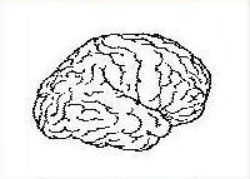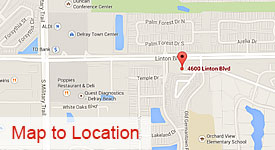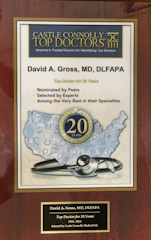Office Location
4600 Linton Blvd, Suite 250
Delray Beach, FL 33445
561.496.1281
Fax: 561.498.7698
Office Hours
Mon: 8:30am - 7:00pm
Tues: 9:00am - 7:00pm
Wed: 9:00am - 7:00pm
Thurs: 9:00am - 7:00pm

Send a Message
Connect with Dr Gross
Palm Beach Fl Psychiatric Services - David A Gross MD
Dr. Gross' practice of medical psychiatry covers a broad range of psychiatric disorders in individuals ranging in age from thirteen and higher. Examples of the clinical disorders treated in his practice include:
Mood Disorders:
Mood disorders consist of cyclic and non cyclic disorders. Bipolar disorder (manic depressive illness) represents an instability of mood that leads to episodes of severe depression with occasional bouts of mania. Cycling can occur rapidly (e.g., weekly) or less than four times yearly. Many individuals previously diagnosed with major depressive disorder are often found to suffer from bipolar disorder. The treatment of major depressive disorder can be quite different from that of bipolar disorder.
Reactive depressive states occur. It is sometimes difficult to differentiate a situational depressive mood state (unhappiness) from a life stress that triggers a biological predisposition that results in a pathological depression.
In addition, there are a number of medical mimics of mood disorders including abnormalities of the thyroid gland, vitamin deficiencies, female and male hormonal disturbances, medications, cancer.
Anxiety Disorders:
Currently, anxiety disorders can be classified into panic disorder (with or without agoraphobia), social anxiety disorder, obsessive compulsive disorder, phobic disorders, generalized anxiety disorder (aka the worry syndrome).
Pharmacotherapy can be very effective but a combination of cognitive behavioral therapy and pharmacotherapy is the ideal approach. As debilitating as anxiety disorders can be, they are rewarding to treat because of the potential for a good outcome. Dr. Gross is pleased to be affiliated with a number of expert cognitive behavioral specialists that serve to provide a team approach.
Trauma Syndromes:
Post Traumatic Stress Disorder (PTSD) is the classic trauma syndrome and is technically an anxiety disorder. However, he believes that the spectrum of traumatic disorders deserves a separate section because of their special nature and ubiquitousness. Trauma spectrum disorders is a more appropriate term due to the very limiting criteria that PTSD currently utilizes. Sadly, trauma syndromes are more common than previously believed. It is his belief that many primary psychiatric disorders like substance abuse, eating disorders, depressive and anxiety disorders may have trauma at their core.
Treatment generally requires a combination of pharmacotherapy and specialized psychotherapy.
Attention Deficit Hyperactivity Disorders (ADHD):
The number of adults presenting for a possible ADHD assessment has been astounding. Most commonly, an adult comes into the consultation shortly after learning that their child has been diagnosed with ADHD and the signs and symptoms seem most familiar to the parent. There is a tremendous overlap between the symptoms of the adult and childhood forms of ADHD. However, the trials, tribulations, complexities and necessary multi-tasking of adulthood make this disorder especially disruptive. Family, occupation, hobbies and quality of life are impacted.
Pharmacologic management can be quite successful, but ADHD coaching and psychotherapy are often necessary. A lifelong history of ADHD can negatively influence personality development and psychotherapy can be quite helpful in correcting false perceptions. ADHD coaching however, focuses on improvement in time management and organizational capabilities.
Substance Abuse Disorders:
The successful management of a person in recovery requires a team approach. Intra-team communication is critical. The team often consists of 12 step meetings, an active sponsor and a psychotherapist knowledgeable of addictive disorders. Pharmacotherapy may be necessary to dress comorbid psychiatric disorders. Unfortunately, our pharmacologic armamentarium is quite limited with respect to agents that directly address the addictive process.
Neuropsychiatric Syndromes:
Neuropsychiatric disorders represent the psychiatric sequelae of neurologic illness. Multiple sclerosis, stroke, epilepsy, traumatic brain injury, dementia and parkinson's disease are common examples. Pharmacotherapy and psychotherapy management of these patients require sophisticated knowledge and experience on the part of the clinician.
Psychosomatic/Somatoform Disorders:
These disorders are typically most perplexing and frustrating for the non-psychiatric physician. Individuals with these disorders end up going for extensive and expensive testing before the absence of a primary medical etiology is determined. By the time the patient gets to the psychiatrist there is a significant degree of frustration and loss of faith in the medical profession on the part of the patient.
Treatment entails intensive psychotherapy with a major focus on education and clarification of the underlying psychological processes responsible for the physical complaints. Pharmacotherapy addresses the anxiety and depression that often accompany the physical symptoms.




